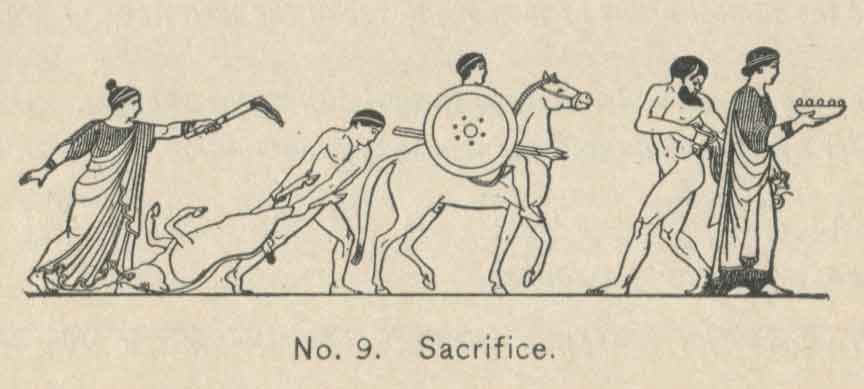S111. The first perfect adds κα, the first pluperfect κη, to the reduplicated theme.
S112. In vowel verbs, the stem may not be affected by adding κα and κη as βουλεύω, βεβουλεύ-κα, ἐβεβουλεύ-κη, κελεύω, κεκέλευ-κα, ἐκεκελεύ-κη.
a. ἔχω has the irregular forms ἔσχηκα, ἐσχήκη.
S113. Verbs whose stem ends in τ-mute (τ δ θ) drop the mute before κα and κη as ἀθροίζω (ἀθροιδ), ἤθροι-κα, ἠθροί-κη.
S114. Some verbs whose stem ends in a π-mute (π β θ) or a κ-mute (κ γ χ) add α and η instead of κα and κη, and aspirate the final letter of the stem, changing π and β to φ, and κ and γ to χ as πέμπω, πέπομφ-α (with change of ε of the stem to ο), επεπόμφ-η. διώκω, δεδίωχ-α, εδεδιώχ-η. ἄγω, ἦχ-α, ἤχ-η.
S115. The perfects and pluperfects just described (114) are called second perfects and pluperfects.
S116. Vocabulary.
διαρπάζω, διαρπάσω, διήρπασα, διήρπακα, plunder completely, sack.
θύω, θύσω, ἔθυσα, τέθυκα, sacrifice.
στρατεύω, στρατεύσω, στράτευσα, στράτευκα, (compare στρατιά, στρατιώτης) make an expedition.
δᾱρεικός, οῦ, ὁ, daric (a gold coin).
θεός, οῦ, ἡ, god, godess.
Κλέαρχος, ου, ὁ, Clearchus.
ὅρκος, ου, ὁ, oath.
φόβος, ου, ὁ, (compare φοβερός), fear.
γάρ, conjunction, for (a postpositive).
διά, preposition, with genitive, through, with accusative, on account of.
πρός, preposition, with genitive, over against; with dative, at; with accusative, to, against, towards.
S117.
1. ἐσχήκατε
2. ἐλελύκει
3. ἐστρατεύκασι
4. τέθυκε
5. ἐσχήκη
6. ἡρπάκαμεν
7. διηρπάκεσαν
8. πέπομφας
9. ἐκεκελεύκεσαν
10. ἐπὶβεβουλεύκασι
Answers:
1. Yous have had. 2. He had loosed. 3. They have made and expedition. 4. He has sacrificed. 5. I had had. 6. We have plundered. 7. They had sacked. 8. You have sent. 9. They had commanded. 10. They have plotted against.
S118.
1. We have had.
2. I have commanded.
3. They have pursued.
4. you have sent.
5. He has plotted against.
Answers:
1. ἐσχήκaμεν 2. ἐκεκελελύεκη 3. ἐδεδιωχεσαν 4. πεπομφας 5. ἐπὶβεβουλεύκε
S119.
1. τοὺς πολεμίους δεδιώχαμεν διὰ τῶν κωμῶν εἰς τὴν θάλατταν.
2. καὶ τὰς ἁμάξᾱς οἱ βάρβαροι διηρπάκεσαν.
3. τριᾱκοσίους δᾱρεικοὺς ἐπεπόμφεμεν τοῖς ὁπλίταις.
4. Κλέαρχος δὲ ἐπεβεβουλεύκει τοῖς Πέρσιας.
5. οἱ στρατιῶται τὸν ἄνθρωπον ἤχεσαν πρὸς Κῦρον.
6. οὐκ εκεκελεύκει ὁ Κλέαρχος τοὺς στρατιώτᾱς θύειν.
7. ἐπὶ τὴν τῶν πολεμίων χώρᾱν ἐστρατεύκατε.
8. λελύκᾱσι τοὺς (their) ὄρκους οἱ στρατηγοί˙ οὐ γὰρ τεθύκασι τοῖς θεοῖς.
9. ἤθροικας, ὦ Κῦρε, ἐπὶ τοὺς βαρβάρους τοὺς πελταστὰς καὶ τοὺς τοξότᾱς.
10. οἱ δὲ στρατιῶται τὰς ἁμάξᾱς ἐλελύκεσαν διὰ τὸν (their) τῶν πολεμίων φόβον.
Answers:
1. The enemy we pursued through the village to the sea. 2. The wagons, the barbarians had plundered completely. 3. Three hundred darics we had sent to the hoplites. 4. Klearchus, he had plotted against the Persians. 5. The soldiers had led the man to Cyrus. 6. He did not command (Clearchus) the soldier's to sacrifice. 7. To the place of the enemy yous have made an expedition. 8. They violated their oaths, those generals. For they have not sacrificed to the gods. 9. You gathered, O Cyrus, against the barbarians, the peltasts and bowmen. 10. But the soldiers their wagons they destroyed, for the enemy, they feared.
S120.
1. We have broken our oaths.
2. The soldiers had sacrificed to the gods.
3. Have the peltasts sacked the villages?
4. The soldier has plotted against Cyrus.
5. His brother had ordered Cyrus to send gifts.
Answers:
1. τοὺς ὁρκους λελύκαμεν. 2. οἱ στρατιῶται ἐτεθυκεσαν τοῖς θεοῖς. 3. διηρπακασιν οἱ πελτασταὶ τὰς κώμᾱς; 4. ὁ στρατιωτης ἐπεβεβουλύεκε τῷ Κύρῳ. 5. ὁ αδελφος εκεκελευκει Κῦρον δορα πέμπειν.

End Of Chapter
This Revision Copyright ©2012 by Shawn Irwin